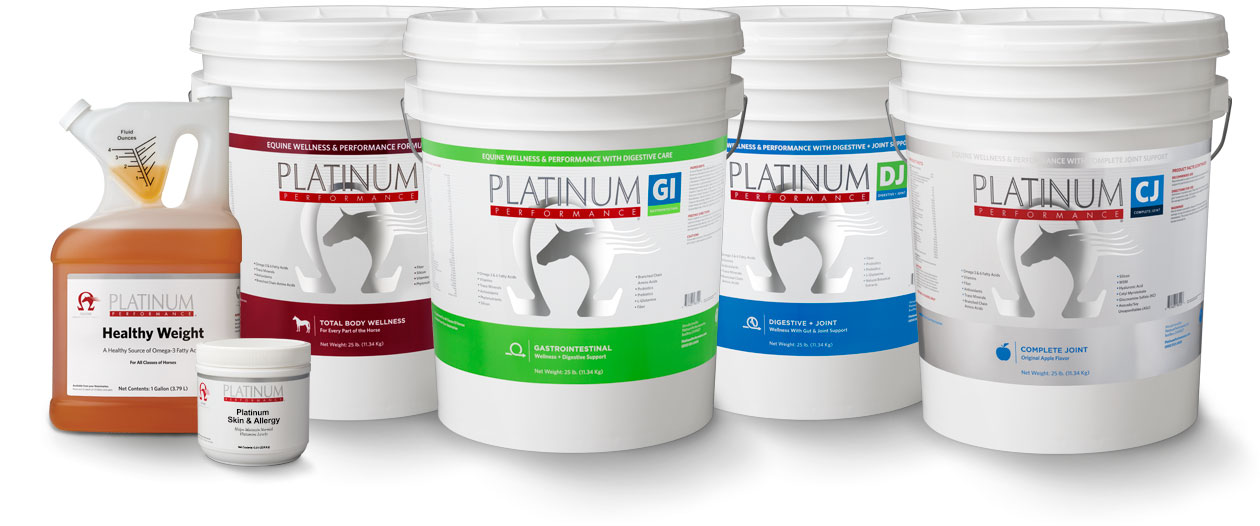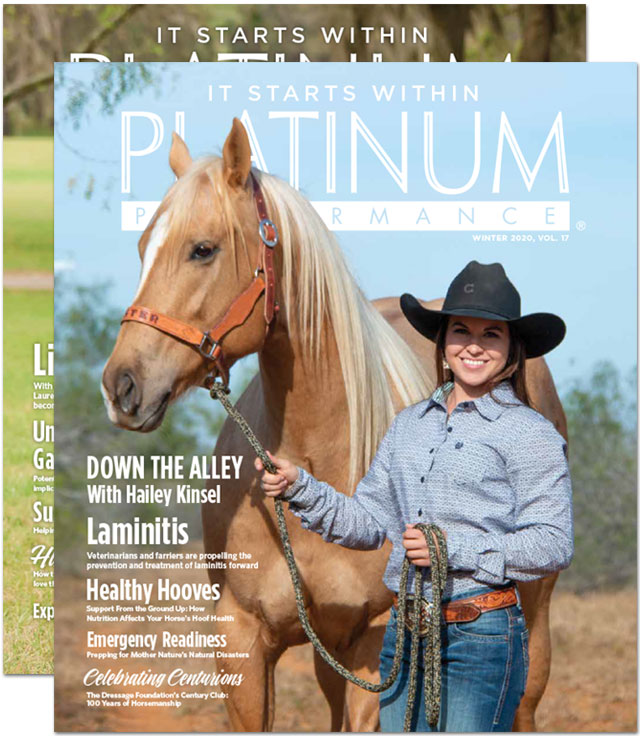Managing Your Horse's Seasonal Allergic Support
Seasonal allergies can be more than just a nuisance for horses affecting overall health; disposition and performance; as well as skin health and the appearance of the hair coat. Targeted supplementation within a balanced diet based on forage can significantly impact the allergic response.
What is a Seasonal Allergy?
A seasonal allergy is an immune disorder characterized by hypersensitivity to specific protein molecules, called allergens, that result in an extreme immune and excessive inflammatory response. Most commonly, allergic reactions affect the skin and respiratory airways in horses and generally develop in response to exposure to seasonal irritants such as molds, spores, insect bites and certain proteins present in pasture grasses.
These allergies are ubiquitous. Potential causes are everywhere in the typical horse’s environment, making them difficult to avoid and pinpoint diagnostically. Identifying the problem as specifically as possible is the primary goal often found by using an elimination strategy and seeing what improves the allergy symptoms. Identifying the etiology can help lead to an individualized treatment plan.
Symptoms
- Itchiness
- Hives
- Dermatitis
- Hair loss
- Runny nose
- Sneezing
- Coughing
- Weepy or goopy eyes
- Exercise intolerance
Omega-3 Fatty Acids Help Manage Seasonal Allergies
Dietary management can provide support for seasonal allergies. Fatty acids are constituents of every single cell membrane throughout the body of the horse. There are several types of fatty acids, but specifically omega-6 and omega-3 fatty acids are directly correlated to the seasonal allergic response. Metabolites of the omega-6 fatty acids induce strong inflammatory responses, which are linked to allergies and other chronic disorders. In the equine diet, cereal grain — corn, oats and barley — as well as grain-based feeds and corn oil contain high levels of omega- 6 fats. In contrast, omega-3 fatty acid metabolites have the capability to promote healthy inflammatory effects to support seasonal allergies. Fresh grass contains excellent levels of omega-3 fatty acids. Flaxseed and flax oil provide plantbased omega-3 fatty acids and nutrients that are precursors to both DHA and EPA (eicosapentaenoic acid). DHA and EPA are long-chain omega-3 fatty acids that help promote a normal, healthy immune response to seasonal allergens.
Numerous studies support omega-3 fatty acids’ salutary response to seasonal allergies. As evidence, one study showed allergic skin reactions to the extract of Culicoides spp., the aggravator of sweet itch, were reduced in horses after 42 days of flaxseed supplementation (O’Neill W, McKee S, Clarke A. Can J Vet Res 2002). Another in-house trial reviewed skin reactions to common allergens following intradermal skin injections in horses receiving a comprehensive wellness formula, which contains flaxseed and flax oil, algal DHA and various micronutrients. All reactions were significantly reduced after 11 weeks of supplementation. Wheal sizes on the skin for a mixed grass antigen decreased by more that 50% post-injection in horses receiving the supplement when compared to their values prior to supplementation. Similar results were noted in response to the Culicidae, the mosquito family, and Culicoides spp. antigens.
What is IBH?
Insect Bite Hypersensitivity goes by many names, including sweet itch, summer itch and Queensland itch. It is a type of seasonal dermatitis caused by an allergy to the saliva of biting insects. The horse’s skin becomes hypersensitive in response to the bites and can result in intense itching. Raised areas of the skin are called wheals and swelling may be seen. Horses may rub their skin.
Tips to Manage Seasonal Allergies
Vet Check
Routine wellness exams are suggested to maintain good health and prevent issues.
- Many veterinary practices offer wellness packages for proactive care with annual or biannual “checkups” for adult horses in the spring and/or fall. This is an opportunity for veterinarians to take an objective assessment of general health through a physical exam, deworming, vaccinations, bloodwork and dental care.
- Routine wellness minimizes health care costs by catching smaller issues before they become major health concerns and can make sure your horse is healthy heading into allergy season.
Spring Clean
A thorough spring cleaning of the barn can minimize dust, mold and pollen.
Environmental allergens pose a major problem in the spring and summer when pollens and molds produce rapidly and insect populations are high.
- Try using dust-free bedding materials and rubber mats that don’t generate excess dust.
- Consider removing horses from the stalls during the cleanout.
- Make sure turnouts, paddocks and pastures are adequately watered, and wet down barn aisles to reduce dust being kicked up with foot traffic.
- Store hay away from horses as hay particles and spores can irritate allergies.
Bug Off
Bug bites cause allergic reactions, and insect control measures are especially helpful.
- Try a barrier technique like fly gear: a fly sheet with neck, belly and tail coverage; a finemesh fly mask; and boots or leggings.
- A fly spray that combines repellent and pesticide ingredients is also helpful.
- Stable horses during times of the day when insect activity is highest like dawn and dusk.
- Minimize standing water where many bugs live and breed. If possible, keep horses away from ponds and marshes, and clean water tanks often.
- Clean stalls regularly and store manure far from horses.
- Provide ceiling, aisle or stall fans in the barn. Many insects are weak flyers and circulating air may prevent them from landing.
Review Diet
Dietary management may provide support for seasonal allergies.
Feeding a balanced diet to support general immune health is one of the best defenses to keep the equine body prepared for seasonal allergies.
- Provide a forage-based diet and a comprehensive supplement that offers omega-3 fatty acids, trace minerals, vitamins and antioxidants.
- For allergy-prone horses, wet hay or use a hay steamer, and feed it on the ground.
- Choose a diet based on high-quality forage with minimal grains and concentrates.
- Assess the horse’s weight, and feed to support a healthy body condition.
- Provide fresh, clean water and consistent access to plain, white salt.
Supplement
Supplements that focus on seasonal allergies help to maintain a horse’s comprehensive health before problems arise and can support a horse with seasonal allergies.
- Specific nutrients — omega-3 fatty acids like DHA (docosahexaenoic acid), quercetin and other antioxidants — provide support for immune health and seasonal allergies.
- Quercetin, widely used for its antioxidant and immune-supporting properties, helps maintain normal histamine levels.
- For weight gain, choose a healthy oil, such as omega-3-rich flax oil, to support normal levels of inflammation.
Immune Boost: Did You Know?
Horses will respond more severely to an allergen depending on the state of their immune health. With a seasonal allergic response being attributed to a variety of immune system challenges, maintaining the equine body’s defense system becomes essential. Research shows that over 70% of the immune system resides in the gut. Because of this correlation, veterinarians recommend taking a gut-forward approach for a healthy microbial population through the use of prebiotics, probiotics and glutamine. Omega-3 fatty acids and antioxidants are also considered key immunonutrients.
Platinum Formulas Can Help

Platinum Performance® wellness formulas provide comprehensive nutrients including omega-3 fatty acids, vitamins, trace minerals and antioxidants for a wholebody approach.
Healthy Weight is a natural source of omega-3 fatty acids from cold-pressed flax oil and infused with natural vitamin E to support a healthy body condition and immune health.
Platinum Skin & Allergy supports normal histamine levels and may be helpful in horses with seasonal allergies. This formula provides DHA, a potent omega-3 fatty acid, to maintain immune health, and quercetin, a naturally occurring antioxidant, to maintain healthy histamine levels. If your horse suffers from seasonal allergies, add Platinum Skin & Allergy into your horse’s supplement program 4-6 weeks ahead of the season change.
Far-Reaching Innovative Ingredients
- Turmeric, a plant with a history of medicinal use dating back nearly 4,000 years, is primarily known for its ability to support healthy levels of inflammation and provide antioxidant benefits with far-reaching effects on digestion, immune health, metabolism and seasonal allergies.
- Tamarind Seed Extract supports healthy levels of inflammation and eases discomfort associated with daily activity. It also has been shown to support gut health by maintaining intestinal wall thickness, preserving the gut lining and promoting healthy levels of GI inflammation.
- Yeast Extracts diversify the prebiotic and postbiotic benefits delivering a more comprehensive approach to gut health by maintaining digestive balance, intestinal integrity and gut barrier function, as well as supporting a healthy immune response to seasonal allergies.





